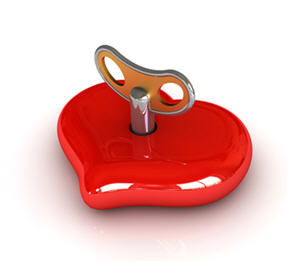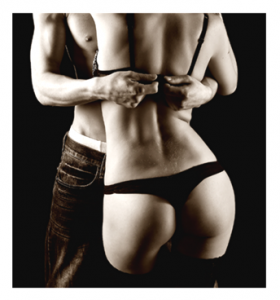The key to your heart? It’s a charming (and romantic) expression for letting someone in, for making yourself vulnerable, for risking, for trust.
 But do we really think that love is so easily secured – and guaranteed? That relationships can ever be all locked up? Will a promise, a marriage certificate – or a lock on a bridge – prevent an unforeseen event that may break our hearts?
But do we really think that love is so easily secured – and guaranteed? That relationships can ever be all locked up? Will a promise, a marriage certificate – or a lock on a bridge – prevent an unforeseen event that may break our hearts?
An article in Sunday’s New York Times, “An Affront to Love, French-Style,” by Agnès C. Poirier, explores the response of Parisians to foreign tourists who have been placing locks on the city’s bridges.
Intended to symbolize eternal love, Ms. Poirier asserts that the issue goes beyond defacing historic architecture. As the title of her piece suggests, this is about cultural differences when it comes to love.
Incidentally, the French capital isn’t the only city where padlocks adorn a variety of structures – or overwhelm them. Apparently this practice has been taking place for a number of years, and love locks also appear in Germany, Canada, Italy, Russia and elsewhere.
As for the authorities in Paris, they’ve previously removed what some consider to be eyesores. But the latest word from AFP is that the locks, for now, will not be cut down.
Does Love Require Freedom?
According to Ms. Poirier, it isn’t so much the fact of defacing bridges that irks Parisian pride. It’s the objects themselves, and the implication that love can be locked up, the key tossed, and consequently, the couple’s devotion – secured.
Ms. Poirier points out the tenuous nature of love, its inability to be guaranteed, and she references French philosopher Alain Badiou in doing so:
In his recent book, “In Praise of Love,” the French philosopher Alain Badiou reminds us that love implies constant risk… For Mr. Badiou, love is inherently hazardous, always on the brink of failure and above all vulnerable.
Could she be right? Could love, French-style, require an acceptance of individual freedom that is more pragmatic than love American-style?
Whether or not you believe Ms. Poirier has gone overboard on the rationale for Parisian petulance over lock-laden bridges, her premise is intriguing.
Are the French culturally predisposed to a more open view of love?
Amorous Anarchy?
 How much of our language and culture operates with an assumption of being all “set” once we “find the one” and then, marry him or her?
How much of our language and culture operates with an assumption of being all “set” once we “find the one” and then, marry him or her?
How many of us still cling to convictions that once legally wed, we’re safe from any of life’s disruptions?
Could it be that the French truly are more free when it comes to love, or are they more realistic about human nature – not to mention, more willing to turn a blind eye to affairs when it comes to sexual freedoms?
Is this all so much myth?
Don’t misunderstand; I’m not proposing amorous anarchy. But if not free love, what about freer love – recognizing that emotions cannot be caged?
Intimacy
Surely most of us reach a point in life when we seek a safe and loving connection, the comfort of being accepted as we are, and let’s not forget about passion. In other words, physical and emotional intimacy is the Holy Grail.
There are also times in life when we want little to do with anything that resembles ownership or exclusivity. Why do we deem that “wrong” or inferior, when theoretically, we believe in individual choice?
I understand there are many sorts of affection, engagement, and yes – love. I treasure commitment, yet I possess a strong need for freedom. Naturally, my own marriage and divorce play into my attitude, but my approach was more “French” long before I married, if I dare to use such a description.
Personally, I believe there are no locks for love in life; only, as Ms. Poirier might say, “embracing [love’s] fragility.”
You May Also Enjoy
The “Love Locks” just look like a different form of graffiti to me. In short, ugly with a stupid premise.
Freedom is crucial to keeping love alive… however affairs don’t fall into that category, (for me). Falling (back) in love with the same person, over and over again is what joins your heart to someone else’s. There are so many different reasons you love that person, it makes for a stronger, more resilient love.
I prefer the idea of some (other) designated structure where people can place locks if thy wish. (It looks trashy to me. As you say, like graffiti.)
As for resilience (and a willingness to invest over and over), would that we could all believe.
I remember seeing these on the Ponte Vecchio in Florence and wondering what they were about. Silly stuff, like carving on a tree. Promises, locks, legal contracts – there are never any guarantees. Surely grown ups know this? The French may or may not have different attitudes to other parts of the world, but we each have our own backgrounds and beliefs to sort out. There are many things to admire about the French culture, but I’m not sure whether their approach to relationships is necessarily one of them – or even if one can pigeon hold ‘the French approach’…
Excellent points, Shelley. And while I was clearly generalizing about the “French approach,” so was the writer I referenced, though plenty who commented on her NYTimes piece strongly disagreed with her opinions!
My experience is just that – my own. Not representative in any more global sense, though I will, for now, assert my belief that my own approach is less “American” than most.
“If you love someone, set them free.” “One cannot promise the heart.”
Two basic premises. Am I French?
I am also a bit less American than many of my peers. When it comes to love – it seems so much more gray than black and white as there is “love” and then there are the emotions that we have in relationships which are at times “love” and at times we refer to them as love though from the outside or even from our own perspective, that is not what we believe love to really be.
I do believe that love can only be found in freedom, otherwise it would be a form of slavery. I also believe that when love wanes for a season, commitment is the tie that binds successful relationships long enough for the love to bloom once again.
I’m sure I’ve said it before and will in the future, but today, the urge has overcome me to say it now.
I love love love your writing.
You can put a virtual lock on that and throw the virtual key away.
You just made my day… Thank you! (And how lovely of you to take the time to comment.)
When my husband proposed to me 33 years ago he did so while also saying… “don’t answer me now…take time to think about it, no hurry, no pressure.” He knew me well enough to know that while I loved him dearly, my freedom was as dear to me. If there had been a hint of a lock I would have bolted. The beautiful ring he chose was almost more than I could stand. Again…after I said YES…he said, “Don’t wear the ring for a while. Try it on in the privacy of your room, but no pressure to wear it in public.” I put it on and never took it off. I have celebrated my decision for 3 plus decades knowing that my dear sweet husband was, is and will be committed to my well being.
He sounds like a very wise man, Kristine.
I think that you might know this already but I have a PACS with my honey and how very French that is–une pacte civil de solidarité. Solidarity. We stand by each other. No “until death do us part” just a promise that is alive and evolving.
I find this to be a wonderful alternative to marriage American-style. I’ve known a number of couples (with and without children) who have lived and loved in this “status.” I’m glad you stopped by to add this mention, Heather. (It would be wonderful if you felt like discussing it further chez toi.)
I really think that it works well for us, two people who were very, very independant before meeting. I did write a bit more about that here: http://lostinarles.blogspot.fr/2012/06/pearl-of-bora-bora.html
Bonne soirée!
Heather
Merci!
I like Johnny Depp’s approach. When he and Wynona Ryder split up, he changed his tattoo from “Winona Forever” to “Wino Forever.” I believe he married a Frenchwoman after that.
That would be Vanessa Paradis. Somewhere around 14 years with Depp, I think, Wolf. And currently in the process of splitting up…
I wholeheartedly agree with Julie. I love reading your posts and admire your gentle guidance towards the “truth for ourselves,” all the while remaining so nonjudgemental about completely diverse subjects!
Having said the above, I think what the French are trying to communicate is married or not, PACSed or not, a COMMITMENT is only worth the value assigned to it by each INDIVIDUAL.
Legally bound or not, either someone loves you and/or you him and you BOTH have the ability to STAND TOGETHER through thick and thin. One is ALWAYS there and committed to the well being of the other. This is Solidarity.
In my experience, couples are happy or unhappy, devoted or unfaithful, married or not. That’s my French interpretation…
Thank you for your kind words, La Bergère. And as you can tell, I agree with your perspective that someone is either truly with you (and honoring their commitment to everything you share) or, they live something less – with or without realizing it. To me, the piece of paper has little to do with actions and emotions. (A French interpretation? Je crois, plus ou moins.) 🙂